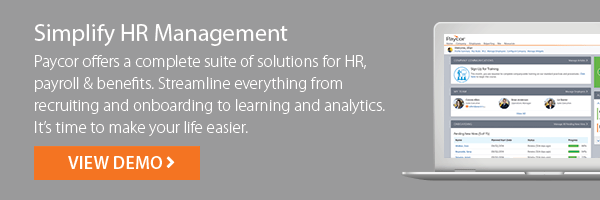Succession management, especially with unemployment at an all-time low, is critical to long-term workforce planning. Not only does it offer employers a way to identify and develop top performers for future internal positions, but it can impact engagement by showing employees they’re a valued member of your organization. In fact, a Software Advice study found that 62% of employees would be more significantly engaged at work if their employer instituted a succession plan. Utilizing your human resources metrics can help the succession planning process.
Succession Management Defined
Succession Management is the process of recruiting talented employees, developing their knowledge, skills and abilities while preparing them for future leadership roles.
What if you don’t have a succession plan in place?
While some only think of executive-level positions for succession planning, your entire organization can feel the effect. What if a trusted software coder with 20+ years of experience and intricate product knowledge suddenly retires, where do you turn? Or what if you lose a growing, talented performer because the individual lacked a clear understanding of future opportunities within your company.
Without a plan in place to keep talented people or utilize their knowledge, you could experience a setback that will impact productivity and performance, ultimately hurting your bottom line.
Here are actionable steps to enhance engagement and improve retention across your organization.
3 Areas of Focus
Succession management isn’t something that can be easily wished into existence, it’s a process that requires you to develop, communicate and execute a plan that should apply to everyone within your organization.
Here are three strategies to build a successful succession strategy:
- Performance management
- Ongoing coaching and development
- Learning management
Performance management is changing.
For years, performance management and counseling consisted of a yearly assessment designed to track progress against goals. But times are changing. Instead of waiting for the obligatory review, employers are offering their people more frequent opportunities to discuss what’s working, understand problem areas and identify future career opportunities.
Implementing regularly scheduled check-ins are a critical communication tool to ensure employees are accomplishing their goals and happy with their current role. Plus, understanding your employees’ aspirations can help identify their future career path while taking into account other areas of the business where they can make a difference. For example, you may have an employee who started in sales but has a passion for supporting clients and resolving issues. While they may be contributing in their current role, taking the time to introduce them to a colleague in client service shows that you’re invested in their development and willing to help them find the right opportunity.

It’s essential that businesses have a system in place to identify, recognize and reward top performers. The right HR solution can offer customizable employee performance reviews, peer-to-peer performance feedback and goal management and tracking. Measuring performance and providing a detailed record is a critical first step in identifying top internal employees and matching their interests with business needs.
Put me in coach!
Another important piece of the succession management puzzle is providing employees with ongoing training and development. Training does not stop a few months after an employee is hired. It should be part of a continuous plan that provides specific skills and knowledge employees need to excel in their role and advance in their career. This career development guide can help HR teams form a plan. Helping employees improve both personally and professionally is a key driver of engagement and ultimately retention.
Management Development
According to a Gallup study, more than 50% of managers feel disconnected from both their responsibilities and their organization’s mission. Because this group is trusted to engage and motivate their teams, it’s mission-critical for the C-Suite to develop a strong foundation to support and develop future company leaders.
Management development programs should focus on increasing foundational management skills across throughout the organization, no matter the department or function. Creating consistent practices and setting the same expectation for managers should be the goal. To enhance managerial skills, many organizations offer formal management development training opportunities.

Combat Job Hopping
Gone are the days when one employee stayed in the same role or even the same company for the duration of their career. According to Forbes, nearly 60% of Millennials are entertaining the idea of a new job opportunity as you read this article. In addition, 21% reported changing jobs within the past year, compared to only 7% of employees who make up Gen X. If you don’t promote growth opportunities for a multi-generational workforce, your retention rates will feel the impact.
To prevent job hopping, employers are investing in learning management tools that deliver personalized content to educate and engage employees. It’s no secret that untrained employees are far less productive, lack motivation and quickly grow disengaged with their role and their employer. The more continuous learning opportunities you can offer your people to develop their knowledge, skills and abilities, the more prepared they will be to take on expanded roles across your organization.
How Paycor Can Help
Paycor specializes in helping businesses of all sizes retain top performers with HR and learning management solutions. If you’re looking to optimize your performance management programs, better track training and employee development and offer structured learning opportunities, contact our team.
 Ellie Elder, Paycor’s Director of HR Business Partners.
Ellie Elder, Paycor’s Director of HR Business Partners.





